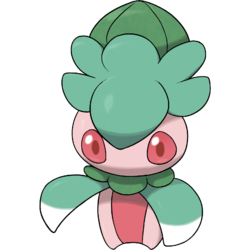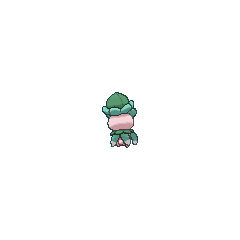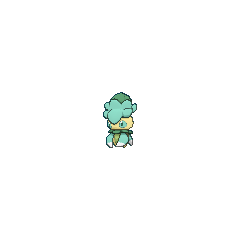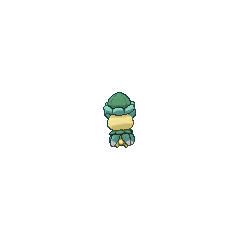From Bulbapedia, the community-driven Pokémon encyclopedia.
|
|
| Line 242: |
Line 242: |
|
| |
|
| ===Origin=== | | ===Origin=== |
| Fomantis is likely based on the {{wp|Hymenopus coronatus|orchid mantis}}, which is known for being able to mimic the {{wp|orchid}} flower, along with the orchid itself. | | Fomantis may be based on the {{wp|orchid}} flower along with the {{wp|Hymenopus coronatus|orchid mantis}}, reversing the {{wp|Mimicry|mimetic}} relationship between those two organisms. |
|
| |
|
| ====Name origin==== | | ====Name origin==== |
Revision as of 20:50, 24 December 2019
Fomantis (Japanese: カリキリ Karikiri) is a Grass-type Pokémon introduced in Generation VII.
It evolves into Lurantis when leveled up in the day starting at level 34.
Biology
Fomantis is a small, plant-like Pokémon. It has large, dark pink eyes with slightly darker pupils. Bunches of light green leaves surround its head, and a particularly large tuft in front slightly overhangs its face. A small, dark green bulb sprouts from the center of its head, which emits a pleasant aroma. Around its neck is a collar of short, dark green leaves. Extending from its collar are four lighter green leaves with white tips: two in the front and two in the back. In the front, these leaves act as scythe-like arms. Its main body is pale pink with a thick, dark pink stripe down the front and back. It has a stubby tail and two short legs.
In order to achieve evolution, Fomantis stores up energy gathered by photosynthesis. It is nocturnal, so during the day it spreads its leaves wide to catch the sunlight. During the night, it spends its time searching for a new spot to sleep for the next day. It will not stay in the same spot for more than a day due to the danger involved. If anything bothers it while it is gathering sunlight, Fomantis will fiercely attack it. When regularly exposed to sunlight, it grows up with vivid coloration. Though it excels at long-range attacks, it will rarely use those that require it to use its stored photosynthetic energy.[1]
In the anime
Major appearances
Multiple Fomantis debuted in Currying Favor and Flavor!. Ash and Mallow encountered a group of sleeping Fomantis whilst searching for a Mago Berry.
Minor appearances
A Trainer's Fomantis appeared in Balloons, Brionne, and Belligerence!.
Pokédex entries
| Episode
|
Pokémon
|
Source
|
Entry
|
| SM035
|
Fomantis
|
Rotom Pokédex
|
Fomantis, the Sickle Grass Pokémon. A Grass type. Fomantis sleep with their leaves spread to gather sunlight for photosynthesis.
|
|
In the TCG
- Main article: Fomantis (TCG)
Game data
Pokédex entries
| This Pokémon was unavailable prior to Generation VII.
|
| Generation VII
|
|
Alola
SM: #143
|
|
Alola
USUM: #176
|
|
Kanto
#—
|
| This Pokémon has no Pokédex entries in Let's Go, Pikachu! and Let's Go, Eevee!.
|
| Sun
|
During the day, it sleeps and soaks up light. When night falls, it walks around looking for a safer place to sleep.
|
| Moon
|
They give off a sweet and refreshing scent. Cutiefly often gather near the tall grass where Fomantis are hiding.
|
| Ultra Sun
|
When the sun rises, Fomantis spreads its four leaves and bathes in the sunlight. The tip of its head has a pleasant aroma.
|
| Ultra Moon
|
It loves the sunshine. When it basks in the sunlight regularly, it grows up with vivid coloration.
|
|
|
|
|
Game locations
| This Pokémon was unavailable prior to Generation VII.
|
|
|
|
|
In side games
Held items
Stats
Base stats
| Stat
|
Range
|
| At Lv. 50
|
At Lv. 100
|
40
|
|
100 - 147
|
190 - 284
|
55
|
|
54 - 117
|
103 - 229
|
35
|
|
36 - 95
|
67 - 185
|
50
|
|
49 - 112
|
94 - 218
|
35
|
|
36 - 95
|
67 - 185
|
35
|
|
36 - 95
|
67 - 185
|
Total: 250
|
Other Pokémon with this total
|
- Minimum stats are calculated with 0 EVs, IVs of 0, and (if applicable) a hindering nature.
- Maximum stats are calculated with 252 EVs, IVs of 31, and (if applicable) a helpful nature.
|
Type effectiveness
| Under normal battle conditions in Generation IX, this Pokémon is:
|
|
|
|
|
|
|
|
|
|
|
|
|
Learnset
|
|
|
|
- Bold indicates a move that gets STAB when used by Fomantis
- Italic indicates a move that gets STAB only when used by an Evolution of Fomantis
|
|
|
|
|
- Bold indicates a move that gets STAB when used by Fomantis
- Italic indicates a move that gets STAB only when used by an Evolution of Fomantis
|
|
|
|
|
- Moves marked with an asterisk (*) must be chain bred onto Fomantis in Generation VII
- Moves marked with a double dagger (‡) can only be bred from a Pokémon who learned the move in an earlier generation.
- Moves marked with a superscript game abbreviation can only be bred onto Fomantis in that game.
- Bold indicates a move that gets STAB when used by Fomantis
- Italic indicates a move that gets STAB only when used by an Evolution of Fomantis
|
|
|
|
|
- A black or white abbreviation in a colored box indicates that Fomantis can be tutored the move in that game
- A colored abbreviation in a white box indicates that Fomantis cannot be tutored the move in that game
- Bold indicates a move that gets STAB when used by Fomantis
- Italic indicates a move that gets STAB only when used by an Evolution of Fomantis
|
Side game data
Evolution
Sprites
| This Pokémon was unavailable prior to Generation VII.
|
|
|
Trivia
Origin
Fomantis may be based on the orchid flower along with the orchid mantis, reversing the mimetic relationship between those two organisms.
Name origin
Fomantis may be a combination of faux (French for both false and scythe) and mantis.
Karikiri may be a combination of 仮 kari (pseudo-), 刈 kari (prune; trim), and 螳螂 kamakiri (praying mantis).
In other languages
| Language
|
Title
|
Meaning
|
 Japanese Japanese
|
カリキリ Karikiri
|
From 仮 kari, 刈 kari, and 螳螂 kamakiri
|
 French French
|
Mimantis
|
From mimétisme and mantis
|
 Spanish Spanish
|
Fomantis
|
Same as English name
|
 German German
|
Imantis
|
From imitieren and Mantis
|
 Italian Italian
|
Fomantis
|
Same as English name
|
 Korean Korean
|
짜랑랑 Jjarangnang
|
From 가짜 gajja and 랑 (螂) rang
|
 Mandarin Chinese Mandarin Chinese
|
偽螳草 / 伪螳草 Wèitángcǎo / Wěitángcǎo
|
From 偽 / 伪 wèi / wěi, 螳螂 tángláng, and 草 cǎo
|
 Cantonese Chinese Cantonese Chinese
|
偽螳草 Ngaihtòhngchóu
|
From 偽 ngaih, 螳螂 tòhnglòhng , and 草 chóu
|
|
|
|
| More languages
|
 Russian Russian
|
Фомантис Fomantis
|
Transcription of English name
|
|
|
|
Notes
External links

|
This Pokémon article is part of Project Pokédex, a Bulbapedia project that aims to write comprehensive articles on each Pokémon species, as well as Pokémon groups and forms.
|
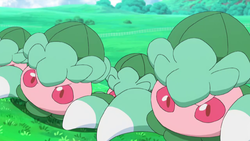
 For other sprites and images, please see Fomantis images on the Bulbagarden Archives.
For other sprites and images, please see Fomantis images on the Bulbagarden Archives.
